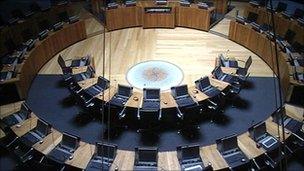Opposition attack on draft budget for Wales
- Published

The draft budget will be debated in the assembly on 18 January
Spending cuts in the draft budget for Wales have been heavily criticised by the assembly government's political opponents and other interest groups.
Conservatives said it put front line services at risk, and Liberal Democrats attacked cuts in economy and transport.
CBI Wales said it "largely failed" to use government spending to support economic growth.
But Plaid Cymru, Labour's coalition partner, praised a refusal to follow Tory budget cuts by up to a quarter.
Revealing the assembly government's draft budget for 2011-2012, external, Budget Minister Jane Hutt announced total health spending would be cut by 7.6% in real terms, with the total spending on education and local government falling by a similar amount.
Hardest-hit were economy and transport and environment, down by more than 21% over three years.
The rural affairs budget was set at £136.6m, down 4.6% on 2010-11.
Nick Ramsay, the Conservatives' finance spokesman, said the draft budget represented a cut of hundreds of millions of pounds to the NHS in Wales over the coming three years.
"That is completely unacceptable and puts front line services at risk," he said.
"The NHS has already faced cuts of £435m this year and it has now been confirmed there is much more to come.
'Fragile recovery'
"The minister's hypocritical claims of protecting health fly in the face of Labour-Plaid's weeks of sustained criticism of the Welsh Conservative pledge to safeguard the health budget."
Welsh Liberal Democrat leader Kirsty Williams said the economic recovery was still fragile and added: "In these circumstances, it beggars belief that the economy and transport department that should be driving the Welsh economic recovery has faced some of the biggest cuts.
"Neither should we be fooled into thinking that this is an education budget when the government are paying for their school funding by cutting cash from universities and FE colleges."
David Rosser, CBI Wales director, said innovation and infrastructure spending needed to be protected if Wales was to grow its way out of the economic recession.
"While the one-off allocation of £47m for capital investment is welcome it is insufficient to meet the challenge we face and will do little to equip Wales with reliable and modern roads and rail," he said.
He called for the assembly government to work with the private sector to attract private funding to substantially improve Wales' ageing infrastructure.
"In the meantime, this budget delivers more potholes on your local highways and byways," he said.
'Difficult decisions'
John Davies, leader of the Welsh Local Government Association, said it was clear that ministers had listened and responded positively to arguments it had made, particularly in relation to social care, and that it supported the "difficult decisions" they had made.
But, facing an overall real terms cut in local government budgets of more than 7% over the next three years, he added: "Councils continue to be concerned that other services will be hit harder than the draft budget would suggest once the protection has been made.
"We remain concerned about cuts to the £1bn plus we receive in specific grants each year and which are not visible on the face of the budget."
Plaid Cymru finance spokesperson Chris Franks rose to the coalition government's defence.
"With the Conservatives and Lib Dems handing out savage cuts to Wales it was always going to be difficult," he said.
"But I am pleased that what we have done is to ensure that the things most important to Wales have been looked after as best they can."
NFU Cymru also gave the budget a cautious thumbs-up.
Ed Bailey, NFU Cymru's president, said: "Given the current financial climate it was inevitable that there would be a reduction in spending on rural affairs in both actual and real terms.
"But I welcome the fact that there is a commitment to fully protect the area of the budget that supports the payment of single farm payments which are fully funded by the EC and which are so vital to farm income.
"I welcome too, the pledge to fully protect funding for the Welsh Rural Development Programme."
- Published17 November 2010